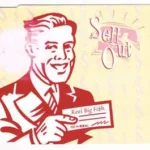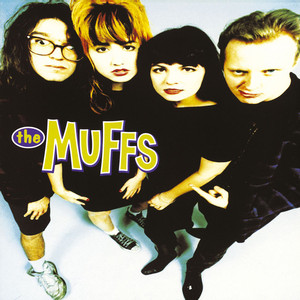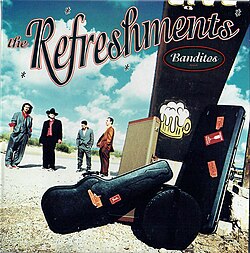 “When Reel Big Fish released Turn the Radio Off in 1996, ska-punk was having one of its brightest and most colorful moments. Bands like The Mighty Mighty Bosstones, No Doubt, and Sublime were bringing fast guitars, big horn sections, and danceable rhythms to MTV and alternative radio. The Southern California group Reel Big Fish, fronted by guitarist and singer Aaron Barrett, arrived with a sound that was just as infectious—but with an extra layer of clever, tongue-in-cheek humor. Their breakout single “Sell Out” became not only their calling card, but also one of the most memorable songs of the entire third-wave ska movement.
“When Reel Big Fish released Turn the Radio Off in 1996, ska-punk was having one of its brightest and most colorful moments. Bands like The Mighty Mighty Bosstones, No Doubt, and Sublime were bringing fast guitars, big horn sections, and danceable rhythms to MTV and alternative radio. The Southern California group Reel Big Fish, fronted by guitarist and singer Aaron Barrett, arrived with a sound that was just as infectious—but with an extra layer of clever, tongue-in-cheek humor. Their breakout single “Sell Out” became not only their calling card, but also one of the most memorable songs of the entire third-wave ska movement.
More than just a catchy party track, “Sell Out” is a funny and fearless look at the music industry and the struggle between underground ideals and mainstream success. Its bouncy horn lines and sharp lyrics gave fans something to dance to and something to think about. Nearly three decades later, the song remains a perfect snapshot of a moment when ska bands were breaking into the big time, and when the idea of “selling out” was a hot topic among fans and musicians alike.
The Scene That Birthed “Sell Out”
To appreciate why “Sell Out” hit so hard, it helps to understand the world it came from. Ska music first emerged in Jamaica in the late 1950s and 1960s, combining Caribbean rhythms with American rhythm and blues. It evolved into the faster, politically charged 2 Tone style in Britain in the late ’70s, and by the late ’80s and early ’90s, American bands were fusing it with punk rock’s energy and attitude. This wave of ska-punk—often called the third wave—found a natural home in Southern California, where backyard shows, all-ages clubs, and college radio fueled a lively scene.
Reel Big Fish formed in Huntington Beach in 1991. They built a loyal local following with sweaty, high-energy shows full of horn blasts, quick tempos, and jokes that often poked fun at themselves. By the mid-’90s, they were sharing stages with other rising ska acts and honing the mix of sharp wit and party-ready sound that would define their breakthrough.
Writing a Hit While Mocking Hits
Aaron Barrett wrote “Sell Out” after years of working odd jobs and dreaming of reaching a bigger audience. The title refers to the accusation that a band abandons its artistic ideals in exchange for money or fame. Instead of writing a serious protest song, Barrett turned the idea into a playful story about a musician who decides to sign a major record deal despite the warnings of others.
The first verse sets the tone:
“Well I know you can’t work in fast food all your life / But don’t sign that paper tonight, she said, but it’s too late.”
It sounds like advice from a friend or parent telling the narrator not to compromise, but he gleefully admits it’s already done. The chorus is even more direct:
“Sell out! With me, oh yeah / Sell out! With me tonight / The record company’s gonna give me lots of money / And everything’s gonna be all right.”
The words are intentionally over the top, making fun of the idea that a big contract will magically solve everything. Barrett sings it with a grin, turning what could have been a bitter complaint into a celebration of absurdity. By laughing at the concept of “selling out,” the band beat critics to the punch.
Music That Demands a Dance Floor
The humor of the lyrics wouldn’t matter if the music weren’t so irresistible. “Sell Out” is a near-perfect example of third-wave ska-punk’s sound. From the very first horn stabs, the song bounces forward on bright guitar upstrokes, a walking bass line, and tight drumming that keeps feet moving. The horn section—trumpets and trombones—answers Barrett’s vocals with punchy riffs and melodic fills, creating a lively call-and-response that feels like a party in full swing.
The production on the Turn the Radio Off version polished the band’s raw club energy just enough to make it radio-friendly without losing its edge. Barrett’s voice sits front and center, alternating between smooth melodies in the verses and full-throated shouts in the chorus. Every instrument gets room to shine, but nothing feels cluttered. It’s a track built for both mosh pits and dance floors.
The Video That Took Over MTV
When Turn the Radio Off hit stores in 1996, “Sell Out” quickly became its standout track. Alternative radio stations picked it up, and MTV put the music video in heavy rotation. The clip leaned into the song’s sarcastic theme by showing the band performing on a cheesy television variety show while business-suited executives look on approvingly. Money rains down, and the band members play along with exaggerated smiles, making the joke clear to anyone watching.
The video helped introduce ska-punk to a wider audience and gave Reel Big Fish a sudden burst of fame. Fans across the country who had never heard of the band were soon skanking to their horns and singing along with every word of the chorus. The single became the band’s calling card and remains their best-known song to this day.
Living the Joke
The biggest twist in the story of “Sell Out” is how the song’s success mirrored its message. Reel Big Fish wrote a song mocking the idea of compromising for fame, and that very song turned them into major-label artists with a national following. Instead of shying away from the irony, they embraced it. In interviews and on stage, Barrett often joked about the contradiction, making it clear that the band understood the humor in their situation.
Despite the exposure, Reel Big Fish never fully softened their sound or their attitude. Later albums like Why Do They Rock So Hard? and Cheer Up! kept the sarcasm flowing, with lyrics that continued to poke fun at the music business and at themselves. They remained a hard-touring live act, keeping their reputation as a band that cared more about fun and connection than about chasing trends.
A Ska-Punk Time Capsule
“Sell Out” arrived at the exact moment when ska-punk was having its big pop-culture breakthrough. The Mighty Mighty Bosstones were scoring radio hits, No Doubt’s Tragic Kingdom was going multi-platinum, and ska rhythms were suddenly everywhere from college dorm rooms to shopping mall soundtracks. Yet even in this upbeat environment, there was tension about what it meant for underground bands to sign to major labels. Punk purists often criticized groups for “selling out,” while musicians wrestled with the reality of making a living.
Reel Big Fish captured that debate in a way that was both funny and universal. Fans could laugh at the lyrics while still dancing to the beat, and musicians could relate to the mix of excitement and skepticism about success. The song distilled an entire scene’s complicated feelings into one joyful, sarcastic anthem.
Legacy and Lasting Appeal
Today, “Sell Out” stands as more than just a ’90s ska hit. It’s a reminder of a time when alternative music was playful, when horns and humor could share space with punk guitars, and when a band could turn a serious topic into a giant inside joke. The song continues to appear in movies, TV shows, and video games, introducing new listeners to ska-punk’s infectious spirit.
For Reel Big Fish, it remains the highlight of their live shows. Audiences around the world still shout every word of the chorus, celebrating the very concept the band set out to mock. The fact that a song about selling out became their enduring anthem only deepens the fun.
Sailing On the Joke
“Sell Out” endures because it manages to be many things at once: a danceable ska-punk party song, a clever commentary on the music industry, and a self-aware wink at the idea of success. It invites listeners to laugh at the contradictions of art and commerce while giving them a horn-driven soundtrack for the dance floor.
For fans of ska, it’s a cherished piece of the third wave’s history. For Reel Big Fish, it’s the song that made them household names while letting them stay true to their sense of humor. And for anyone hearing it for the first time today, it’s proof that great music can make you think even as it makes you move. In a genre built on energy and irreverence, “Sell Out” remains the perfect mix of both—a timeless reminder that sometimes the best way to handle the pressure of success is to skank, laugh, and play your horns a little louder.


